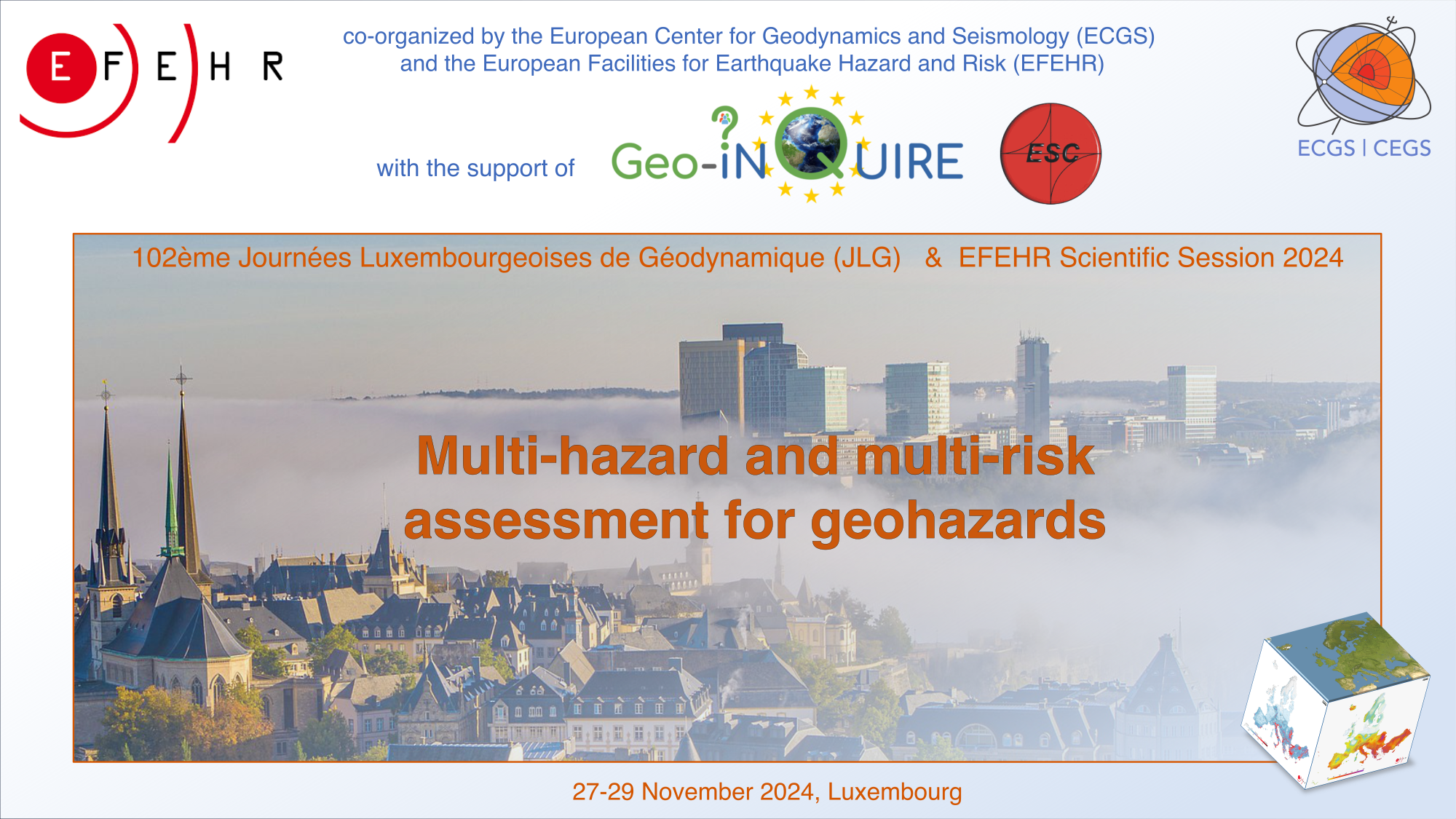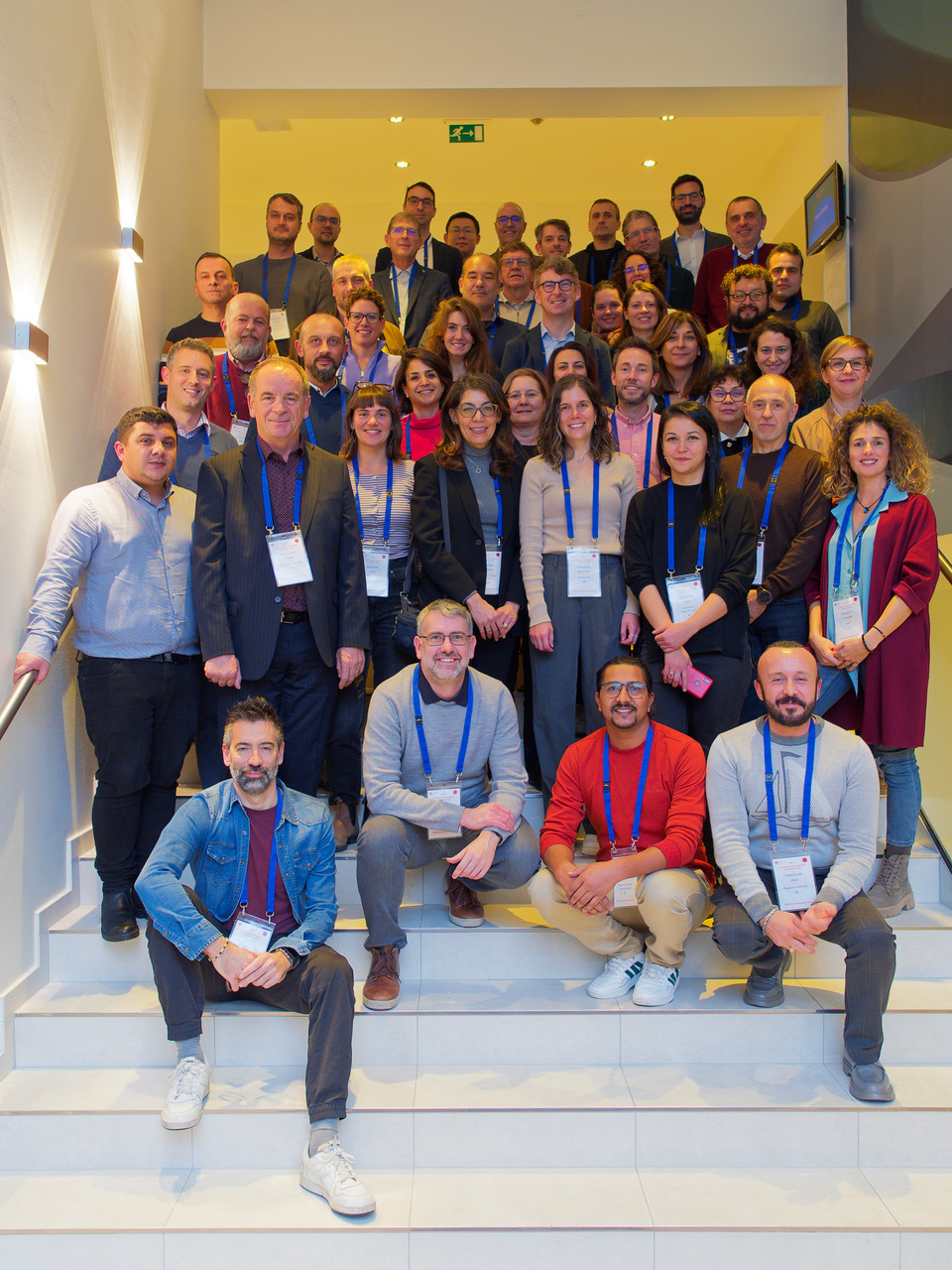Upcoming Events
102nd Journées Luxembourgeoises de Géodynamique (JLG) & EFEHR Scientific Session 2024
Posted in: News > Upcoming Meeting

Many thanks to all participants for a great meeting!

Dates: 27-29 November 2024
Location: Alvisse Parc Hotel, Luxembourg
Hosted by: ECGS
General Overview
Risk assessment bridges the geo-hazards to their societal consequences. As such, it constitutes the most outward-facing component in the chain, starting from gathering the data and modeling the phenomenon towards understanding its consequences. This is where models meet reality; and the reality is invariably complex and multi-risk. In the past decades, the scientific community has established an understanding of single hazards and their direct consequences. However, there is still a lot to explore regarding the complex interactions between hazards and their consequences on society, those situations in which the union is larger than the simple mathematical sum, and where a direct cause and effect pattern can be sometimes difficult to establish.
In this session, we provide a brief outlook through some of the challenges that we face in multi-hazard and multi-risk analysis of geohazards and their consequences. We would like to address questions such as:
- What are the challenges, needs and gaps as seen from the “real world”? What is the point of view of stakeholders and the private sector?
- How can we make the most of multidisciplinary datasets?
- Towards multi-hazard or hazard-agnostic exposure models? Can multi-hazard vulnerabilities be possibly harmonised?
- What is the future of earthquake ground motion models?
- Which are the challenges for time-dependent seismic hazard assessment? Can short-term forecasting become operational?
- How to capture the interactions between slow-onset (e.g., sea-level rise, ageing, heat waves) and fast-onset events (e.g., tsunami, earthquakes, landslides)?
- Cross-cutting: how can Machine learning and AI help us with the above challenges?
- How to communicate our research with a broader audience?
We invite the EFEHR members, as well as researchers, practitioners, policymakers, and anyone passionate about the intersection of AI, Earth Sciences, and societal resilience to geo-hazards to participate in this enlightening and inspiring event.
Conveners
- Laurentiu Danciu (ETH Zurich)
- Adrien Oth (ECGS)
- Fatemeh Jalayer (UC London)
Local Organisers
- Adrien Oth
- Yannick Breh
- Maxime Jaspard
- Gilles Celli
Programme
The full programme of the meeting can be found
here.
Venue and Practical Aspects
The meeting was held from 27 to 29 November 2024 at the Alvisse Parc Hotel Luxembourg.
Summer School in InSAR – time series processing and deformation modelling – If you need InSAR… MasTer it !
Posted in: News > Upcoming Event > Upcoming Meeting
The European Center for Geodynamics and Seismology (ECGS) is organising a
Summer School in InSAR, time series processing and deformation modelling entitled
“If you need InSAR… MasTer it !”.
- When: May 22-26 2023
- Where: Luxembourg city (details will follow)
For who:
PhD candidates, postdocs or scientists involved in SAR/InSAR processing and who want to learn the MasTer Toolbox (an automatic InSAR and ground deformation time series processing software) and DefVolc (a 3D inverse modelling software).
See the details below for more explanations about these software.
The summer school is not open to commercial users.
A maximum of 20 participants will be accepted.
Application:
- by a email to ndo@ecgs.lu before February 22, 2023.
- participants are invited to send their application with a short description of their background, current position, and motivation to apply to the summer school (max 1/2 page).
Selection:
- the selection will be made according to the relevance of the applications
- selection will be closed as soon as the quota is reached.
Cost:
Participation is free of charge.
In addition, the organisation will take in charge for the accepted participants, from Monday 22 to Friday 26 of May:
- the accommodation
- breakfasts and lunches
- an ice-breaking dinner
Participants are responsible for their travel, extra nights (if any) and dinners.
Requirements:
- participants must have at least some basic knowledge in Linux or macOS command line
- lectures will be given in English. Manual and documentations are written in English. Support will also be available in French during the hands-on exercices if needed.
- participants must bring a Mac or Linux computer. There is no strict minimal hardware required but InSAR and modelling are computers’ ressources consuming: 8 GB of RAM and 1TB of disk would be fine for the school. However, the more RAM and hard disk space you have, the easiest and fastest it will be for you (envisage an external drive if needed).
- Participants’s computers will be preferably connected to the Internet through wired connections (Ethernet-switch). For maximum speed bring a Gigabit-Ethernet adapter if needed (Mac users !).
- MasTer requires several external tools such as gdal, GMT, Python3, snaphu… For the sake of efficiency, and to ensure correct and complete installation, accepted participants will be provided with an installer prior to the summer school in order to prepare their computers. Their installation will be checked at the summer school.
- participants can bring a small set of images from a satellite and/or a site of their interest to perform MasTer hands-on exercises.
For operating MasTer Toolbox:
For operating the DefVolc pre and post-processor
- a version of gmsh more recent than 2.10.1.
- Matlab Runtime installed corresponding to Matlab version R2022a
- Matlab Runtime downloadable at: https://www.mathworks.com/products/compiler/matlab-runtime.html
Deadlines:
- applications open until February 22 2023 or until the quota is reached
- decision: March 3 2023
- Summer School: May 22-26 2023
Speakers:
- Valérie Cayol (Laboratoire Magmas et Volcans, Clermont Ferrand)
- Dominique Derauw (Centre Spatial de Liège)
- Maxime Jaspard (European Center For Geodynamics and Seismology)
- Nicolas d’Oreye (European Center For Geodynamics and Seismology)
- Sergey Samsonov (Natural Resources Canada)
- Delphine Smittarello (European Center For Geodynamics and Seismology)
Tentative program:
Monday May 22 AM:
- Arrival and welcome of the participants
- Lunch
- PM: introduction to InSAR and MasTer Engine ; MasTer Toolbox installation on participant’s computers
Tuesday May 23
- AM: MasTer Toolbox : architecture, DEM, masks, parameters and processing of individual interferograms
- Lunch
- PM: MasTer Toolbox : InSAR mass processing ; MSBAS ground deformation time series processing ; time series of amplitude images processing
- Ice breaking dinner
Wednesday May 24
- Lunch
- PM: MasTer Toolbox : web page (share/display results) and data manipulation (plots and usage with QGIS)
Thursday May 25
- AM: Hands-on exercises with images of interest to the participant or provided data
- Lunch
- PM: Deformation modelling using DEFVOLC software and/or hands-on exercices
Friday May 26 AM:
- Deformation modelling using DEFVOLC software and/or hands-on exercices
- Lunch
- Closure
Take Away:
- participants will be provided a full version of the MasTer Toolbox, as well as its installer and manual
- participants will be granted an access to a GitHub repository where they will be able to get further updates about MasTer Toolbox.
- participants will be provided with a compiled version of the software required to run the DefVolc pre and post-processor.
More informations
Feel free to send us any question at the following address: ndo@ecgs.lu
MasTer Toolbox:
MasTer toolbox is a tool dedicated to the processing of Synthetic Aperture Radar (SAR) images. It is mostly designed to allow optimized mass processing of SAR interferometry (InSAR) and the production of 2/3D ground deformation time series. However, MasTer toolbox can also be used for the production of Digital Elevation Models (DEM), coherence maps and amplitude images time series e.g. for land cover or geomorphological changes, flood mapping etc.
MasTer toolbox is made of three components:an InSAR command line processor (the MasTerEngine), the MSBAS processor (for the computation of 2/3D time series of ground deformation) and a bunch of shell scripts for automatizing all tasks, from data downloading to updated displacement maps and time series and possible automatic display on a dedicated webpage.
MasTer is able to process nearly all the SAR sensor currently available (ERS1 & 2, EnviSAT, ALOS, ALOS2, RadarSAT, CosmoSkyMed, TerraSAR-X, TanDEM-X (incl. bistatic and pursuit mode), Sentinel1 A & B, Kompsat5, PAZ, SAOCOM, ICEYE…).
The Multidimensional Small BAseline Subset (MSBAS) time series software allows inverting simultaneously several interferometric SAR time series acquired along different acquisition modes, including different sensors, SAR wavelengths, incidence angles, polarization etc., to solve for horizontal and vertical component of the ground displacement.
For more information about MasTer Toolbox, see e.g. (Smittarello et al. 2022), (Derauw et al. 2020)
To see an exemple of MasTer results, visit:
https://terra3.ecgs.lu/defo-domuyo/
DefVolc:
DefVolc is a software for inverse modeling of volcano displacement data (InSAR, GNSS), whether the sources of displacement are fracture (fluid filled fracture or faults) or massive reservoirs.
DefVolc is based on a 3D Boundary element method for elastic media combined with inversions, based on near-neighborhood inversion algorithms. Topographies are taken into account as well as interactions between sources. Boundary conditions are stress changes.
Defvolc consist of a pre-and post processors. Inversions can be run on the on demand on the University Clermont-Auvergne Clusters.
Defvolc manuals and compiled programs are available to registered users on the web site: https://www.opgc.fr/defvolc/
Users can register with the project code “anonymous”.
Past Workshops & Meetings
Protected: 101st Journées Luxembourgeoises de Géodynamique (JLG) Presentations
Archived in: Events > Past Event
There is no excerpt because this is a protected post.
101st Journées Luxembourgeoises de Géodynamique (JLG)
Archived in: News > Past Event
After a 2-years break imposed by the Covid-19 pandemic, the European Center for Geodynamics and Seismology (ECGS) was pleased to organise the 101st edition of its meeting series Journées Luxembourgeoises de Géodynamique (JLG), held from 5 to 7 September 2022 in Luxembourg and dedicated to the subject of Intracontinental basaltic volcanic fields. This year’s meeting was co-organized with the GFZ German Research Centre for Geosciences in Potsdam, Germany. The JLG are intended to serve as a platform for scientists throughout the various disciplines of the Earth Sciences to meet and discuss in a rather informal setting in order to foster the international collaboration.
98th JLG: European ground motion models from the past to the future
Archived in: Archived News > Past Event
The 98th “Journées Luxembourgeoises de Géodynamique” (JLG) took place on 14-16 November 2016 at the Alvisse Parc Hotel in Luxembourg City. The 98th edition focused on the subject of European ground motion models from the past to the future: Lessons learned and new trends and was held as a strongly discussion-based workshop. The 98th JLG were organised by ECGS and Section 2.6 of the German Research Center for Geosciences (GFZ) in Potsdam, Germany.
Protected: ECGS & ESC/EAEE Joint Workshop: Abstract Volume
Archived in: Past Event
There is no excerpt because this is a protected post.
ECGS & ESC/EAEE Joint Workshop: Earthquake and Induced Multi-Risk Early Warning and Rapid Response
Archived in: Archived News > Events > Past Event
The 2015 ECGS workshop, organized in collaboration with the European Seismological Commission (ESC) and the European Association for Earthquake Engineering (EAEE), aimed at providing a platform to gather around one table scientists and engineers, including researchers and engineering practioners, to discuss and look for solutions to the problems still encountered in and foster their collaboration.
